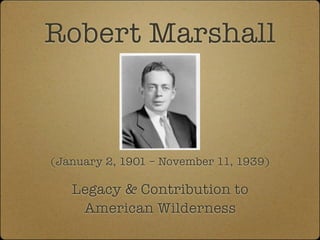Robert Marshall & Wilderness Act
- 1. Robert Marshall (January 2, 1901 ¨C November 11, 1939) Legacy & Contribution to American Wilderness
- 2. Background Son of constitutional lawyer, BS in Forestry from Syracuse Louis Marshall University in 1924 Spent summers in the Scored the highest in the nation Adirondack Mountains at a on the Civil Service test for family resort, Knollwood Foresters Family used wealth to forward MS in Forestry from Harvard social justice issues University in 1925 Attended the Ethical Culture PhD from John Hopkins School in NYC University in 1930 Heros were Lewis & Clark Largely credited for being the driving force for the Wilderness Spent one year at Stanford Act of 1964
- 3. Scienti?c Monthly Article Published in The Scienti?c Monthly in February 1930, "The Problem of the Wilderness" had already been rejected by four other magazines, but it became one of his most important works. He argued that wilderness was worth saving not only because of its unique aesthetic qualities, but because of its ability to provide visitors with a chance for adventure.
- 4. Post Article Started the Wilderness Society, dedicated to the protection of land ˇ°untouched by the hand of manˇ± Spent a year in Alaska and wrote Arctic Village Named Director of Indian Forest Service in 1933
- 5. ˇ°Although huge sums of money are involved in and basis of calculation, the most important value of forest recreation are not susceptible of measurement in monetary terms. They are concerned with such intangible considerations as inspiration, aesthetic enjoyment, and gain in understanding.ˇ±
- 6. The Original 46-R Climbed 42 of the 46 Adirondack peaks above 4000 feet in 1921 In 1932, Marshall climbed 14 Adirondack peaks, over 4000 feet, in 19 hours Was very disciplined and logged all his hiking and peaks climbed Logged many 30-50 mile hiking days
- 7. "There is just one hope of repulsing the tyrannical ambition of civilization to conquer every niche on the whole earth. That hope is the organization of spirited people who will ?ght for the freedom of the wilderness."
- 8. Advocate, Politician, Government Employee Made few friends in government and advocated for Native American land rights Marshall was the leading force behind the wilderness preservation movement
- 9. What Could Have Been? Marshall had health problems throughout his life Died at age 39 from a heart attack Left all of his family fortune to the wilderness cause
- 11. Following Marshall's untimely death in 1939, nearly a million acres of pristine wild land in Montana was designated as "The Bob Marshall Wilderness Area," meaning that no roads, structures, or mechanized transportation would be allowed. This tract is one of the most preserved ecosystems in the world and is indeed a ?tting tribute to the man who fought so hard to save the scant remaining wild places from the inroads of development and mechanization.











